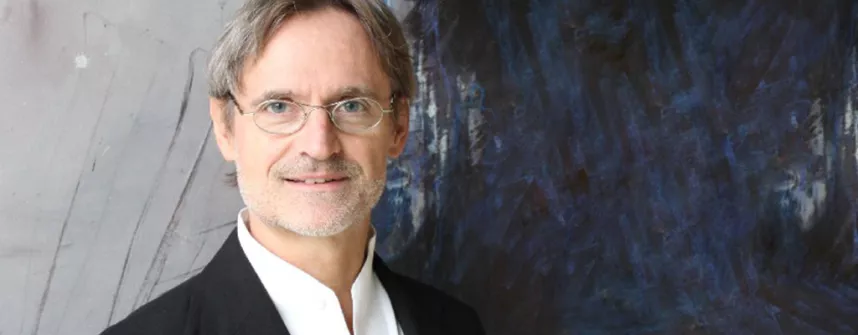Pioneer in a Digital Universe
(Soure: Constructor University)
Never before in human history has so much data been created so quickly. It is increasingly becoming a valuable resource. At the same time, however, the rising flood of data is making it difficult to extract this "gold" of the digital revolution. Dr. Peter Baumann, Professor of Computer Science at Bremen's Jacobs University is making data usable – for instance for better prediction of natural events. He is a university teacher, scientist, and entrepreneur.
"Rasdaman" is the name of the company of Dr. Peter Baumann, who was born in 1961. The term stands for the more prosaic "raster data manager"; after all, he is a computer scientist. However, Baumann is also a music fan. That's why the Rosenheim native selected the colors red, gold, green for his company – the colors of the Rastafarian movement, of which Reggae legend and "rastaman" Bob Marley was once a member.
"Rasdaman" stands for a multiple-award- winning, internationally successful software, that visualizes, standardizes, processes, and analyses multidimensional data structures known as arrays. "In research, you don't normally do any large-scale software development", says Baumann. "You develop ideas, try them out, write a paper. Often there is no sustainability; things get lost. We don't want that".
The Bavarian sees himself as a scientist and engineer. It is not enough for him to think a topic through; he also wants to offer practical, usable solutions. "The more diversely they can be used, the better". For instance, his company with its seven employees works intimately with the Jacobs University to provide an open source version of Rasdaman. Together, the two partners continuously develop the technology further.
Baumann is under way as a kind of explorer in the infinite expanse of the data universe. He visualizes and analyses data to unlock its secrets. In this process, he is always dealing with larger volumes of three, four, and five-dimensional data. The data comes from satellites and sensors that scan the earth at different times and places. It contains data on vegetation, analyses of oceans, or recordings of structures, such as roofs. In addition, computer- generated data, such as weather forecasts, are administered and analysed in Rasdaman.
When combined and networked together, they provide new insights: For instance on the spread of wildfires in California, on changes in arctic ice, the development of the size of refugee camps, or predictions of impending water shortages. "EarthServer" is the name of this project, which is coordinated by the Jacobs University and sponsored by the EU and brings together partners from Europe, Australia, and the USA.
And now, Rasdaman will even be going into space. The European Space Agency will install the program on one of its satellites. "Orbidanse" (Orbital Big Data Analytics Service) is the name of the project, which Baumann explains as follows: "Data can be transmitted by a satellite only when it is overflying a ground station. This time window is narrow, too narrow if there are transmission errors. Data can be lost. Now, with the help of Rasdaman, the satellite will for the first time be able to answer concrete questions, such as the spread of an oil slick in the Gulf of Mexico. Such precise questions provide more precise and thus shorter answers, which can then also be transmitted more reliably within the time window. This is a brand new quality".
The passionate salsa dancer has been conducting research and teaching at Jacobs University since 2004. It was an opportunity to help build something new that drew him to Bremen. And it is the internationality and interdisciplinarity of the private research university that motivates him again and again. "As a computer scientist, you normally sit in front of a monitor and think about something. Here I come together with geologists and brain researchers, with cosmologists and seismologists. Personally, that is very enriching to me, and scientifically, it moves us all forward".
Enriching – he also feels enriched by the students. They come from a good dozen different countries. Baumann integrates them into his research projects at an early point. Like him, they, too, are not interested in mere theory, but also in applications and solutions. That makes them sought-after graduates. After graduation, about one-third of them go into research and two-thirds to industry.
Baumann's research interests mesh with one of the newest courses of study at the Jacobs University: Data Engineering. To the degree that the flood of data swells, people are needed, who are able to analyse and interpret it. Computer scientists, of course, would understand a great deal about computers and algorithms, says Baumann, but they wouldn't know enough about the interpretation of the data, for instance in the geo-sciences. Today, interdisciplinary skills are needed. "That is exactly the approach of the Jacobs University. We train these bridge builders between the worlds", says Peter Baumann.
Additional information at:
www.jacobs-university.de/lsis
www.jacobs-university.de/study/graduate/programs/data- engineering
"Big Earth Data – The Digitalized Earth": Documentation data on the earth and its analysis with Prof. Baumann https://www.youtube.com/watch?v=4womWX8JkXQ
Questions will be answered by: Prof. Dr. Peter Baumann | Professor of Computer Science p.baumann@jacobs-university.de | Tel: +49 421 200-3178
